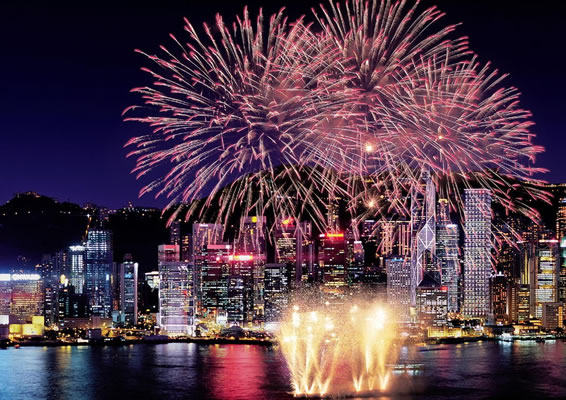Chinese New Year
Chinese New Year starts with the New Moon on the first day of the new year and ends on the full moon 15 days later. The 15th day of the new year is called the Lantern Festival, which is celebrated at night with lantern displays and children carrying lanterns in a parade.
The 15 Days
The first day of the Lunar New Year is "the welcoming of the gods of the heavens and earth."Many people abstain from meat on the first day of the new year because it is believed that this will ensure long and happy lives for them.
On the second day, the Chinese pray to their ancestors as well as to all the gods. They are extra kind to dogs and feed them well as it is believed that the second day is the birthday of all dogs.
The third and fourth days are for the sons-in-laws to pay respect to their parents-in-law.
The fifth day is called Po Woo. On that day people stay home to welcome the God of Wealth. No one visits families and friends on the fifth day because it will bring both parties bad luck.
On the sixth to the 10th day, the Chinese visit their relatives and friends freely. They also visit the temples to pray for good fortune and health.
The seventh day of the New Year is the day for farmers to display their produce. These farmers make a drink from seven types of vegetables to celebrate the occasion. The seventh day is also considered the birthday of human beings. Noodles are eaten to promote longevity and raw fish for success.
On the eighth day the Fujian people have another family reunion dinner, and at midnight they pray to Tian Gong, the God of Heaven.
The ninth day is to make offerings to the Jade Emperor.
The 10th through the 12th are days that friends and relatives should be invited for dinner.
After so much rich food, on the 13th day you should have simple rice congee and mustard greens (choi sum) to cleanse the system.
The 14th day should be for preparations to celebrate the Lantern Festival which is to be held on the 15th night

Traditions
The entire house should be cleaned before New Year's Day. On New Year's Eve, all brooms, brushes, dusters, dust pans and other cleaning equipment are put away. Sweeping or dusting should not be done on New Year's Day for fear that good fortune will be swept away. After New Year's Day, the floors may be swept. In sweeping, there is a superstition that if you sweep the dirt out over the threshold, you will sweep one of the family away. Also, to sweep the dust and dirt out of your house by the front entrance is to sweep away the good fortune of the family; it must always be swept inwards and then carried out, then no harm will follow. All dirt and rubbish must be taken out the back door.
Shooting off firecrackers on New Year's Eve is the Chinese way of sending out the old year and welcoming in the New Year. On the stroke of midnight on New Year's Eve, every door in the house, and even windows, have to be open to allow the old year to go out.
Everyone should refrain from using foul language and bad or unlucky words. Negative terms and the word "four" (Ssu), which sounds like the word for death, are not to be uttered. Death and dying are never mentioned and ghost stories are totally taboo. References to the past year are also avoided as everything should be turned toward the New Year and a new beginning.
If you cry on New Year's day, you will cry all through the year. Therefore, children are tolerated and are not spanked, even though they are mischievous.
On New Year's Day, we are not suppose to wash our hair because it would mean we would have washed away good luck for the New Year. Red clothing is preferred during this festive occasion. Red is considered a bright, happy color, sure to bring the wearer a sunny and bright future. It is believed that appearance and attitude during New Year's sets the tone for the rest of the year. Children and unmarried friends, as well as close relatives are given lai see, little red envelopes with crisp one dollar bills inserted, for good fortune.
for more information check out: http://www.educ.uvic.ca/faculty/mroth/438/CHINA/chinese_new_year.html
Comments (0)
You don't have permission to comment on this page.